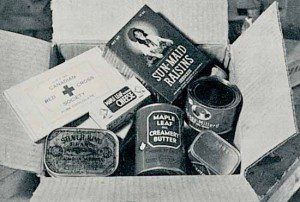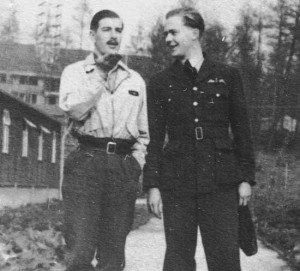
From its first day of operation in 1942, Stalag Luft III abided by the Geneva Conventions (dating back to 1864) recognizing that air officers in the prison camp did not have to work as force labourers.
And even as late as February 1944, South Compound (imprisoning mostly American air officers) and the North Compound (holding mostly Commonwealth air officers) also received and distributed Red Cross parcels. From their introduction to the POW compounds, the contents of the parcels were pooled so that each officer got roughly an equal ration of parcel foods.
On average, each week, a POW air officer received the equivalent of a full parcel from the U.S., Canada or the U.K. Generally, the parcel contents consisted of basic ingredients (sometimes referred to as “housewife treats”) such as soup, cheese, corned beef, salmon, sardines, raisins, pudding, coffee, tea, butter, jams, biscuits, powdered milk, and occasionally sweets such as chocolate or candy.

Tony Pengelly, a pilot officer from Weston, Ont., fulfilled a number of responsibilities inside the compound, among them handing the distribution of Red Cross parcel contents equally among the kriegies (POWs). But as a key member of X Organization (the escape committee) as well, Pengelly had the authority from Big X (Roger Bushell) over the parcels.
“Each Red Cross parcel received, bore with it a list of contents, and from those lists, Big X commandeered anything he thought the organization could use,” Pengelly said.
Do you have a photo of Johnny Travis?
Regards
This is such brilliant reading ……. the art of survival …. with a twist ….